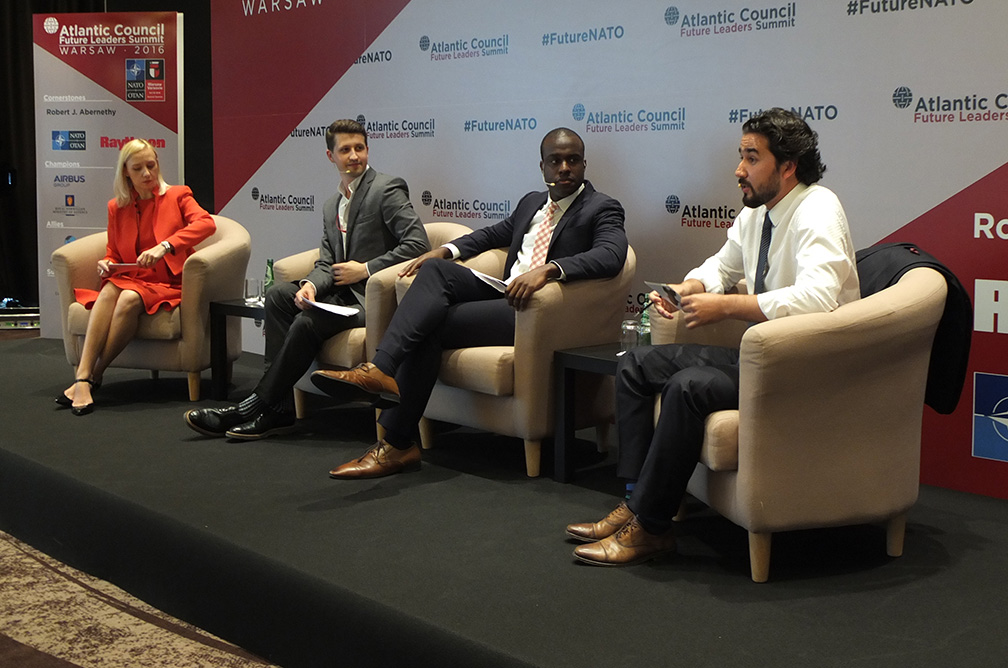 Public diplomacy has long been a positive tool of the United States and its partners, yet we are still losing in the battle happening online.
Public diplomacy has long been a positive tool of the United States and its partners, yet we are still losing in the battle happening online.
At the Atlantic Council’s NATO Future Leaders Summit in Warsaw on July 7, three unique storytellers spoke about their experiences and efforts to bridge this online gap. Maxim Eristavi, a Ukrainian journalist and cofounder of Hromadske International; Matt McDonald, the head of strategy and operations at YouTube Marketing; and Omaid Sharifi the cofounder of ArtLords, conveyed one powerful message: the only way to win the battle online is to recapture the narrative.
Replace myth busting with dialogue
The United States is not winning by playing the same game as antagonistic actors. Eristavi exposed the dangers of myth busting and using counterpropaganda—citing Russia as a chief example. “We think that [Russian] propaganda is about convincing. So we just follow the propaganda narrative” instead of “creating our own agenda,” he said.
Creating a space for dialogue is key, according to Eristavi. To shift from defense to offense, the idea is to engage in dialogue with the audience, rather than fight our enemy’s agenda, he said.
With more cooperation between governments and “independent newsrooms” Eristavi offered a tangible strategy: “stop following [the existing] narrative, and […] start actually engaging [in] dialogue.”
Tell a story, don’t lecture
When it comes to addressing military and diplomatic threats, there is a clear need to take the conversation online. McDonald was intimately aware of social media’s role in the online battle against extremism.
“Targeting young people through the use of social media” is not only a problem, but one we cannot address solely by “taking down and moderating content,” said McDonald.
“Although YouTube is a leader in video, content still exists throughout the Internet…we need to have a positive message that can recapture the dialogue and provide a hopeful message for young people to help them realize that radicalization and violence is not the way to go,” he added.
Storytelling is key because of the online community’s predisposition to high volumes of information on a daily basis.
Effective storytelling is aimed at “engaging the viewer in a dialogue about the pressing question […] in an authentic and direct manner […] rather than talking at the viewers,” said McDonald—citing this video as an example:
As a tool of public diplomacy, video has huge potential online and is already being used to “facilitate meaningful dialogue and recapture it with meaningful counter narratives from expert sources,” according to McDonald.
Identify beyond the wall
While much of the so-called recapturing is taking place online, there are important battles to be won beyond the Internet’s walls. Sharifi’s efforts through ArtLords in Afghanistan is demonstrative of this narrative change and citizen engagement.
“At ArtLords, what we do is we use murals, we use images to tackle [corruption in Afghanistan]. We want to reach wider citizens, the ordinary citizens of Afghanistan who are not educated, who do not have higher literacy. So the best way to reach them is through images and murals,” said Sharifi.
Sharifi cofounded a company that manufactures this engagement—explaining it as an “innovative way to solve our own problems.”
In getting people out of their homes, and disconnecting from the web, they are able to elicit “that feeling of ownership, that feeling of getting involved [in] kids, women, police officers, elderly,” said Sharifi.
It’s about how you connect with “those people behind those big concrete, ugly walls,” allowing them to “share their concerns,” he added.
Victoria Langton is digital communications assistant at the Atlantic Council. You can follow her on Twitter @LangtonVL.
Image: From left: Allison Hart, special advisor at NATO Public Diplomacy Division, moderated a discussion with Maxim Eristavi, a Ukrainian journalist and cofounder of Hromadske International; Matt McDonald, the head of strategy and operations at YouTube Marketing; and Omaid Sharifi the cofounder of ArtLords at the Atlantic Council’s Future Leaders Summit in Warsaw on July 7. (DG ART Projects | www.dgart.pl)
